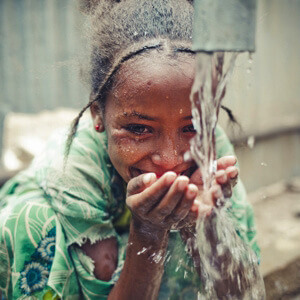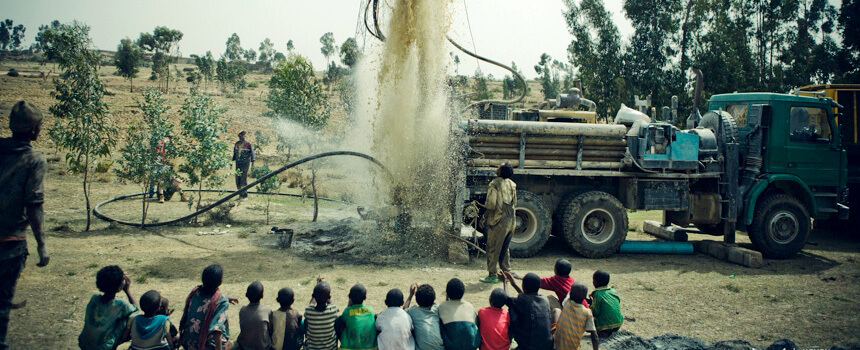 Clean water gives a future
Clean water gives a future
Establishing wells and sanitation in Ethiopia
Mamo has been headmaster of the Ethiopian Tsegedana School since 2007. In March 2017 the school was for the first time equipped with a well and sanitary facilities. For over 800 pupils and twelve teachers, everyday life has noticeably improved. For more than a year now, there has been running water for the children and functioning sanitary facilities. “I notice that the children are much more committed, much more active and more eager to learn. In the past, there were many children who sat in class very tired and exhausted. This is completely different now. The classes are full!” Mamo says. He is very happy that the school is growing since then and he is full of hope that education will help the children to lead a healthy and self-determined life.
Necessity
Wells for drinking water and sanitation facilities for people in Ethiopia
Activity
Local NGO (REST) finds suitable locations and builds wells and sanitation facilities for schools and municipalities with the help of donations.
Countable effort
Number of people who benefit from a clean water supply and sanitation facilities.
Result
Number of pupils who regularly attend classes increases. Expected rise in number of pupils around 40 per cent.
Systemic effect
Improved health and educational opportunities for pupils.
Background
In Ethiopia, access to clean drinking water and hygienic sanitary facilities is often not assured. Every second person in the East African country has no access to clean drinking water. According to the World Health Organisation, in rural areas as much as 70% have no access to clean drinking water and 96% have no access to sanitation facilities (WHO 2017). This means a lack of the most basic necessities of life.
Women and children in particular are responsible for water sourcing. In rural areas, they walk an average of six kilometres a day, carrying a 20-litre canister. This is like about 15 laps around a sports field with two large six-carrier canisters of water. In many cases, the water sources are tainted, but there are no alternatives. In addition, it is hot, there are no roads and the trail is usually uneven. So it is an immense waste of energy, strength and time – spent every day to ensure the water supply. Children in particular then are missing this time for their school education.
Instead of going to school, life-threatening water-borne diseases and the long distances to the water sources prevent millions of children from actually being children and from getting a good education. In Ethiopia, too, many children lack these basic and vital prerequisites to leading a healthy life.
The good deed
The good deed helps to build wells and sanitary facilities in the Tigray region of Ethiopia and thus to impactfully provide perspectives for the future. The good deed is part of the overall project "100% WASH". WASH stands for water, sanitation and hygiene. By equipping schools and communities with wells and sanitary facilities, many children and young people can healthily and permanently go to school on a daily basis. This helps to avoid illness-related absences and the exhausting and time-consuming process of obtaining water. The water supply enables Ethiopian children to concentrate better on their educational career.

AboutEthiopia
Addis Abeba
Capital
105 350 020
Number of inhabitants
1.719
Gross domestic product per capita per year
173
Human Development Index
Ethiopia is the only African country that was never colonised. The official language Amharic has its own alphabet.
About the organization and further information
Association
Neven Subotic Stiftung
Website
https://nevensuboticstiftung.de/
Further information and source
- Völkel, Jan Claudius (2018): Äthiopien. In: Bundeszentrale für politische Bildung: Innerstaatliche Konflikte.
- UN, 2018. Least Developed Country Category. Ethopia Profile.
- WHO/UNICEF Joint Monitoring Program for Water Supply, Sanitation and Hygiene, 2017. Progress on Drinking Water, Sanitation and Hygiene.
- WHO/UNICEF Joint Monitoring Program for Water Supply, Sanitation and Hygiene, 2017. Progress on Drinking Water, Sanitation and Hygiene.
- UN, 2018. Least Developed Country Category. Ethopia Profile.
- Völkel, Jan Claudius (2018): Äthiopien. In: Bundeszentrale für politische Bildung: Innerstaatliche Konflikte.




